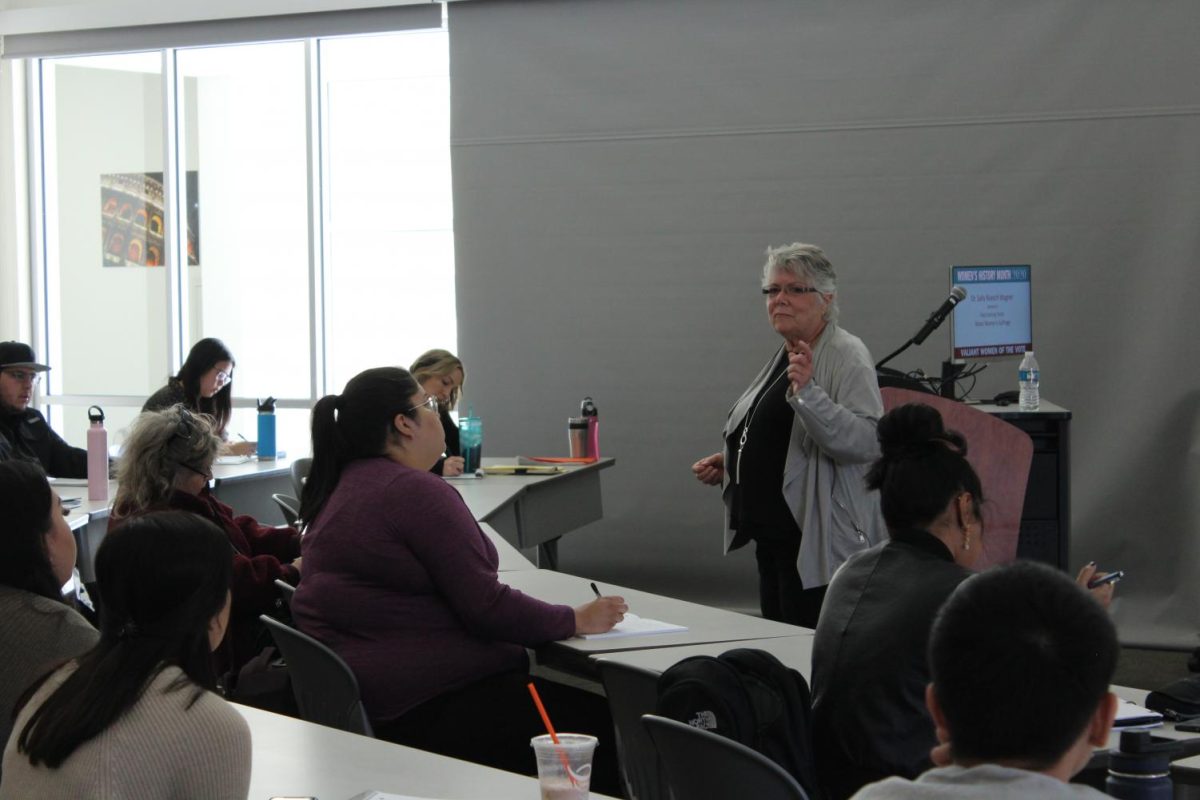Guest speaker starts off Women’s History Month events on campus
Dr. Sally Roesch Wagner kicks off Women’s History Month by discussing “Fascinating Facts About Women’s Suffrage” to students and faculty. The event consisted of Dr. Wagner’s discussion and book signing as well as an open Q&A for students to participate in on Wednesday in Winn 150.
Guest speaker, Dr. Sally Roesch Wagner focused on “Fascinating Facts About Women’s Suffrage” during her discussion and book signing on March 4 at Cosumnes River College.
Every March, there is a series of events set up to celebrate Women’s History Month and this event was set up by history professor, Diana Reed and anthropology professor, Anastasia Panagakos.
This month’s theme was selected to be on the “Valiant Women of the Vote.”
The theme was selected to help recognize the 100th anniversary of the passage of the 19th amendment which ensures women’s voting rights.
A 22-year-old history major, Amanda Ramos said she is currently taking HIST 331 with professor Reed and was fortunate that she was able to plan the event around their class schedule.
“I’m really passionate about American history,” said Ramos. “I really don’t know a section, I just love American history, so the more knowledge the better.”
Known as an activist, author and lecturer, Dr. Wagner was also one of the first women to receive a doctorate in the United States for work in women’s studies.
Dr. Wagner is also known to be a story-teller of women’s rights history and has edited and written “The Women’s Suffrage Movement,” “Sisters in Spirit” and “A Time of Protest.”
Dr. Wagner has taught women’s history for 48 years and was a founder of one of the country’s first college women’s studies programs.
“The story that I learned about the suffrage movement, was that it was a group of white women, privileged, who started in 1848 and worked endlessly and tirelessly, simply for the vote,” said Wagner. “Until 1920, when women finally got to vote in the United States of America.”
Dr. Wagner explained that both African-American and white women, would hold conventions where they were putting their lives at risk during the 1800’s and the early 1900’s.
Dr. Wagner said it was during this time that women were expected to obey their husbands, which also meant women could not own property and lost their legal identity once married.
“Every single thing that you had, became your husband’s,” said Wagner. “Everything that you brought into the marriage and that you gave after the marriage.”
Dr. Wagner said it wasn’t just the fact that women couldn’t vote, it was also that they couldn’t sit on a jury, sue or be sued and they had no right to write their own will or decide what happened to their bodies.
Dr. Wagner said this is a year that we can celebrate and understand that there was a lot of long and hard work put into getting the 19th amendment passed.
“If we don’t tell the truth about our history, danger is that we repeat it,” said Wagner. “We have a lot of work to do against racism in this country today and we have a lot of work to do in 2020 to fight voter suppression.”
Professor Reed set up the event to match up with her students’ class time in order for them to witness and hear Dr. Wagner as the guest speaker.
Reed said she had heard of Dr. Wagner before and was thrilled to have the opportunity to connect with her and have her on campus.
A 19-year-old business major, Jenni Sakakura said she is currently enrolled in a women’s history class.
“I just am really interested in the women’s movement right now and I have been for years,” said Sakakura. “My dad, he really looks down on women so I kind of feel more passionate about it.”
Sakakura said she is really glad that she signed up for a women’s history class and would have gone to the guest speaker event even if she didn’t have to.
“It was really empowering listening to it, that’s why it brought me here and I want to be more educated on it.”

